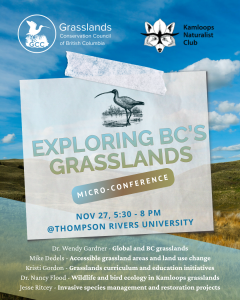
Event Details
Date: Thursday, November 27, 2025
Time: 5:30-8:00 pm
Location: TRU Kamloops Campus, International Building (IB)
Cost: Free (refreshments provided)
Format: In-person and virtual attendance options
This event is organized by Rabeya, the Education and Outreach Assistant for the Grassland Conservation Council of BC in Kamloops, in partnership with TRU’s Wildlife Club, Botany Club, Eco-Club, and the Kamloops Naturalist Club.
Featured Speakers and Topics
The evening will feature five expert speakers, each bringing unique perspectives on grassland conservation:
Dr. Wendy Gardner will provide context on global and North American grasslands, with a specific focus on British Columbia’s unique grassland ecosystems and their place in the broader continental landscape.
Mike Dedels will guide attendees through accessible grassland areas in BC, discussing land use changes over time and their impacts on these sensitive ecosystems.
Kristi Gordon will present the GCC’s new grasslands educational curriculum and showcase impactful student projects that are helping raise awareness about grassland conservation.
Dr. Nancy Flood will explore the wildlife and bird species that depend on grasslands, with a particular focus on those found in the Kamloops area.
Jesse Ritcey will discuss invasive species management and share insights from ongoing grassland restoration projects across the region.
Why Grasslands Matter
Despite their small footprint in BC, grasslands are biodiversity hotspots. These ecosystems provide critical habitat for numerous species at risk, including the Western Rattlesnake, Burrowing Owl, and Grasshopper Sparrow. They also provide important ecosystem services, including carbon sequestration and water filtration.
However, BC’s grasslands face significant threats from urban development, agricultural intensification, invasive species, and climate change. Understanding these challenges and the solutions being implemented is essential for anyone interested in BC’s natural heritage and conservation efforts.
Who Should Attend
This event is designed to be accessible to diverse audiences:
- Students pursuing studies in biology, ecology, environmental science, or related fields
- Conservation professionals and land managers
- Community members interested in local ecosystems and wildlife
- Educators looking for resources and inspiration for environmental education
- Anyone curious about BC’s grasslands and conservation efforts
No prior knowledge of grassland ecology is required—speakers will present information in an engaging, accessible manner suitable for all levels of familiarity with the subject.
Virtual Attendance Option
Can’t make it to Kamloops in person? Virtual attendance is available, allowing participants from across BC and beyond to join the conversation and learn from the featured experts.
Student Volunteer Opportunities
At the end of the event, information about student volunteer opportunities with the Grassland Conservation Council of BC and partner organizations will be shared. These opportunities provide hands-on experience in conservation work and are excellent additions to resumes for those pursuing careers in environmental fields.
How to Register
Registration is free and can be completed online at: https://simpli.events/e/GettingtoknowtheGrasslands
Refreshments will be provided, and the informal format will allow time for networking and questions with the speakers.
About the Organizing Partners
The Grassland Conservation Council of BC (GCC) is a registered charity dedicated to protecting and conserving BC’s rare and highly at-risk grassland ecosystems. Founded in 1999, the GCC works with landowners, communities, researchers, and government agencies to promote grassland conservation through education, research, and stewardship.
TRU’s Wildlife Club, Botany Club, and Eco-Club are student-led organizations dedicated to promoting environmental awareness and engagement on campus and within the broader Kamloops community.
The Kamloops Naturalist Club brings together nature enthusiasts to explore, appreciate, and protect the natural environment of the Kamloops region.


